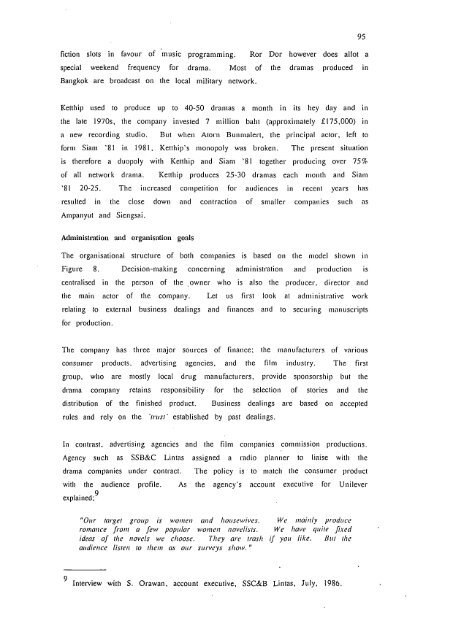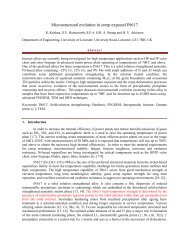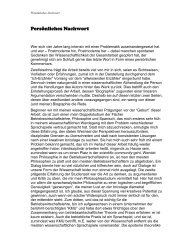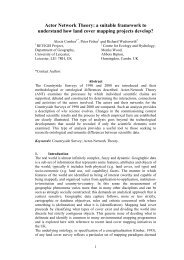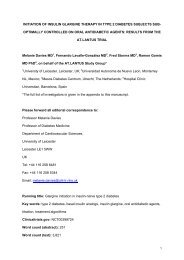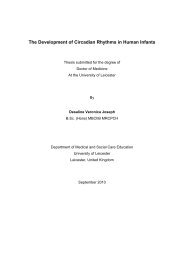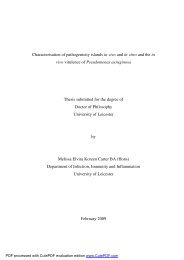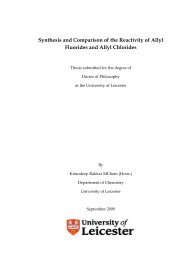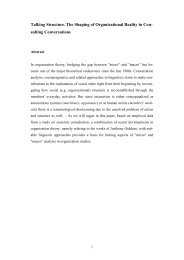iieiiei1eWrkers - Leicester Research Archive - University of Leicester
iieiiei1eWrkers - Leicester Research Archive - University of Leicester
iieiiei1eWrkers - Leicester Research Archive - University of Leicester
You also want an ePaper? Increase the reach of your titles
YUMPU automatically turns print PDFs into web optimized ePapers that Google loves.
fiction slots in favour <strong>of</strong> music programming. Ror Dor however does allot a<br />
special weekend frequency for drama. Most <strong>of</strong> the dramas produced in<br />
Bangkok are broadcast on the local military network.<br />
Ketthip used to produce up to 40-50 dramas a month in its hey day and in<br />
the late 1970s, the company invested 7 million bahi (approximately £175,000) in<br />
a new recording studio. But when Atom Bunmalert, the principal actor, left to<br />
form Siam '81 in 1981, Ketthip's monopoly was broken. The present situation<br />
is therefore a duopoly with Ketthip and Siam '81 together producing over 75%<br />
<strong>of</strong> all network drama. Ketthip produces 25-30 dramas each month and Siam<br />
'81 20-25. The increased competition for audiences in recent years has<br />
resulted in the close down and contraction <strong>of</strong> smaller companies such as<br />
Ampanyut and Siengsai.<br />
Administration aiid organisation goals<br />
The organisational structure <strong>of</strong> both companies is based on the model shown in<br />
Figure 8. Decision-flaking concerning administration and production is<br />
centralised in the person <strong>of</strong> the owner who is also the producer, director and<br />
the main actor <strong>of</strong> the company. Let us first look at administrative work<br />
relating to external business dealings and finances and to securing manuscripts<br />
for production.<br />
The company has three major sources <strong>of</strong> finance; the manufacturers <strong>of</strong> various<br />
consumer products. advertising agencies, and the film industry. The first<br />
group, who are mostly local drug manufacturers, provide sponsorship but the<br />
drama conipany retains responsibility for the selection Of stories and the<br />
distribution <strong>of</strong> the finished product. Business dealings are based on accepted<br />
rules and rely on the 'trust' established by past dealings.<br />
In coiirast, advertising agencies and the film companies commission productions.<br />
Agency such as SSB&C Lintas assigned a radio planner to liaise with the<br />
drama companies under contract. The policy is to match the consumer product<br />
with the audience pr<strong>of</strong>ile. As the agency's account executive for Unilever<br />
explained;9<br />
"Our target group is women and housewives. We mainly produce<br />
romance from a few popular women novelists. We have quite fixed<br />
ideas <strong>of</strong> the novels we choose. They are trash if you like. But the<br />
audience liste,i to i/lent as our surveys show.<br />
Interview with S. Orawan, account executive, SSC&B Lintas, July, 1986.<br />
95


